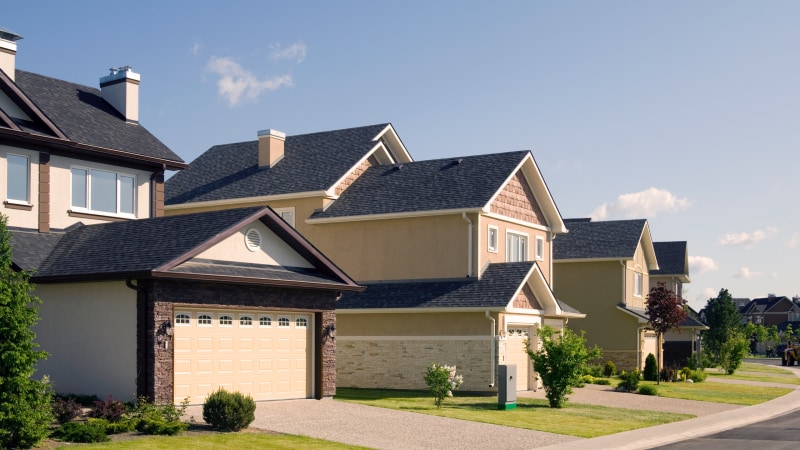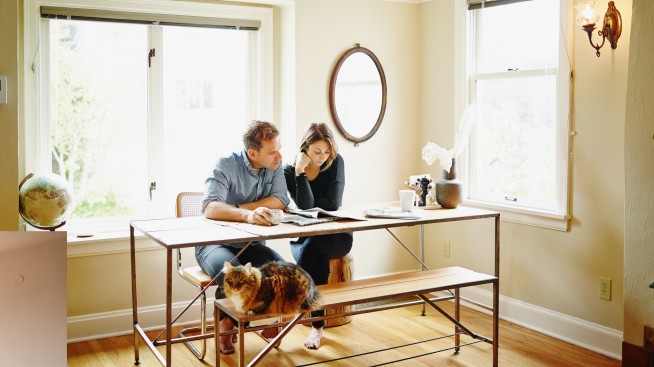How to buy a home in foreclosure

Deciding whether or not you should attempt to purchase a foreclosed home requires the right amount of research and professional guidance. Here's some information to help you decide and how to approach the process if you find a foreclosed property you want to buy.
What is a foreclosed home?
A foreclosed home is one that a homeowner has to give back to their lender because they can no longer afford to make their mortgage payments. The house may then be put on the market by the bank or loan company at a significantly lower asking price. This is usually because banks and loan companies are looking to recover their loan, so they want to sell the home as quickly as possible.
How to buy a foreclosed home
Here's a step-by-step guide on how to buy a foreclosed home so you can decide whether it's a good idea for you:
1. Establish your price point
Before you start searching for a foreclosed home, you should think about what price range you want to stay within. Consider your monthly income, how much you spend on groceries, the average amount you can afford to put toward household bills, repairs and mortgage payments. This will help you determine what house price you can afford. From there, you can establish an overall price point to focus on.
2. Consider hiring a real estate agent who specializes in foreclosures
You don't necessarily need a real estate agent in order to buy a foreclosure, but they can provide expert advice on foreclosures in your search area. They can also help you assess whether a foreclosed home's asking price is worth the potential risks involved, such as budget issues or repairs.
If you know you don't want to hire a real estate agent, start by searching for foreclosed homes online. You can also drive through neighborhoods to see if there are any homes for sale labeled "Foreclosure Property." Make sure you research what other homes, both foreclosed and non-foreclosed, in the area sell for so you can see whether the property you're interested in falls above or below that level.
3. Consider mortgage prequalification
A mortgage prequalification from a lender helps you establish how much you can afford to borrow. In other words, these are the mortgage payments you could make comfortably after taking your existing debt into account. This can further help you narrow your search to reflect foreclosure homes on the market that match your prequalification amount.
4. Make offers on homes that fit your needs and price point
The way you approach this step depends on the type of foreclosure home you want to purchase. If you plan to buy one that is real estate owned (REO) or government owned, you or your agent have to make an offer to the real estate agent working with the bank to sell the home, or to the government agency itself.
If you want to purchase a foreclosure home that is about to go to auction, you or your agent have to make an offer to the person in charge of the auction. In pre-foreclosures, you or your agent have to make an offer to the homeowner.
If you're using a real estate agent, work with them to establish a contingency plan as part of the offer to make sure you can have the home inspected before your purchase is finalized.
5. Get the home inspected to determine additional costs
Contact a home inspector to look over the home you want to purchase. They will give you a detailed report of repairs needed, and point out any potential problems with the home's foundation or overall structure. Some home inspectors also provide a cost estimate for the repairs. This will help you determine if the house is still in your price range after considering the work that needs to be done. Note that this is not the case with auctioned foreclosure properties because you have to bid on and purchase them before you can do an inspection, so weigh your options carefully.
Types of foreclosed homes
Here are the types of foreclosed homes you might encounter during your search, including short sales, auctioned homes, REO foreclosed homes and pre-foreclosures:
1. Short sale
A short sale is where a homeowner gets permission from their bank or lender to sell their home for a little less than their current mortgage. This way, they can quickly sell their home and pay off the majority of their mortgage, leaving only a small amount for them to pay back.
2. Auctioned
Auction foreclosed homes are those sold to the highest bidders at auctions for banks or lenders. Auctions typically require bidders to have cash with them to purchase the home.
3. REO
Foreclosed homes, also called real estate owned, include any home that a bank or loan company bought at an auction to resell on the open market. Once they buy the home at auction, they typically hire a real estate agent to list the house, show the home to potential buyers and take offers.
4. Pre-foreclosure
Pre-foreclosure homes are those that homeowners put on the market when they are not able to make their mortgage payments and know they could lose their home to foreclosure. For this reason, they sell their home, typically for a cheaper price, before it becomes an actual foreclosure.
Where do you find houses in foreclosure for sale?
Figuring out where to start looking for houses in foreclosure might seem a bit more difficult, but you can find a lot of foreclosed properties by searching in the following areas:
1. Government agencies
Government agency websites like HUD.gov provide prospective homebuyers with foreclosure listings in their area.
2. Auctions
Auctions also offer prospective home buyers the chance to bid on foreclosed properties. Do an online search to see what auction houses or events are in the area you're looking to buy. You can also search government websites for resources about where to find government auctions on foreclosed properties.
3. Bank websites
Some banks offer a search feature on their site where you can look for foreclosed properties sold by them or through loan companies. You can usually search by state or city to help narrow your results.
Pros and cons of buying a house in foreclosure
Buying a house in foreclosure has both advantages and disadvantages, and the conditions associated with purchasing a foreclosed home can change depending on the type of foreclosure and the method you use to buy. Here are some common pros and cons about buying a foreclosed home to help you weigh your options:
Pros of buying a house in foreclosure
You may be able to buy a property for less than the normal market price. Banks or loan companies typically set the asking price below the normal rate for a foreclosed home because they want to sell it for the remaining mortgage balance owed by the previous owners. This means that you have an opportunity to purchase a high-quality home for less than the typical asking price for surrounding homes in the area. You can put the money you save toward repairs or other home expenses.
Buyers won't have to take on any expenses related to the previous owners. The title is clear, meaning you don't have to pay liens or back taxes from the homeowners before you.
Buyers can complete necessary inspections during the contingency period. You can secure the home quickly and follow up with inspectors to determine the current state of the house. If the inspection reveals less favorable conditions, like mold or a weak foundation, you may be able to back out of the purchase.
Cons of buying a house in foreclosure
Banks are less likely to negotiate. Depending on the situation, banks might not be open to negotiating a selling price for a home. This is because the selling price for a foreclosed home usually reflects the remaining mortgage balance from the previous owners, so they need to get that amount back.
Foreclosed homes might be in less desirable locations. Some foreclosed homes may be located in areas that aren't as appealing. This might affect your willingness to go through with the purchase, even if the price is reasonable. Similarly, foreclosed homes in nicer areas typically sell out fast, so make sure you check listings daily.
Foreclosed homes might need extensive repairs. Foreclosed homes could be in excellent condition or have hidden problems, and sometimes they have outdated appliances or electrical service, or they could have sat empty for years and need extensive cleaning. A simple home inspection before you decide to buy will help you determine whether or not it's worth it. However, if you love a good DIY project, you might consider this a win. You could use the money you saved from buying the home to put toward significant improvements to create a home that fits your needs.
Foreclosures bring both challenges and benefits to your homebuying process. If you are serious about purchasing a foreclosed home, you need the right person to walk you through the process. Speak to a Home Lending Advisor for help deciding if buying a foreclosure property is a right for you.



